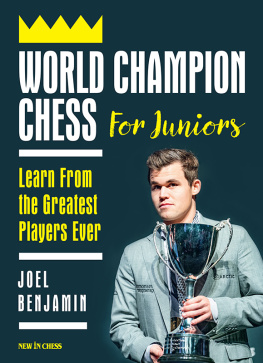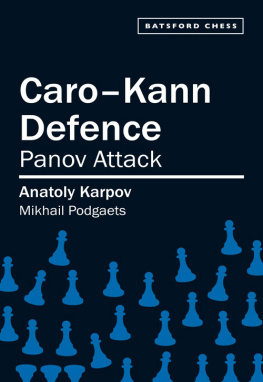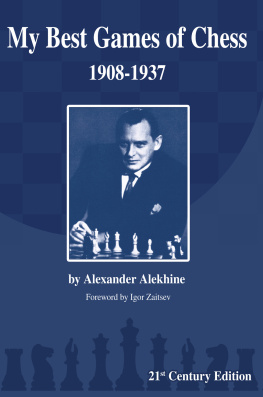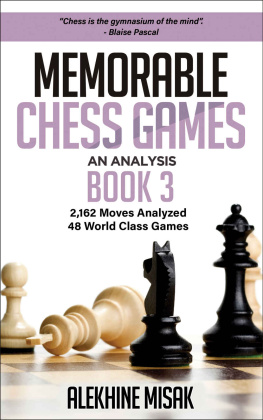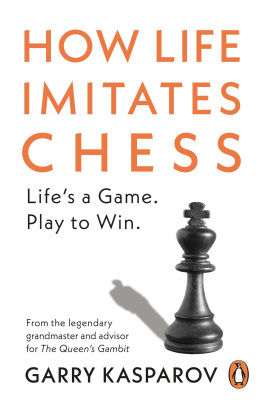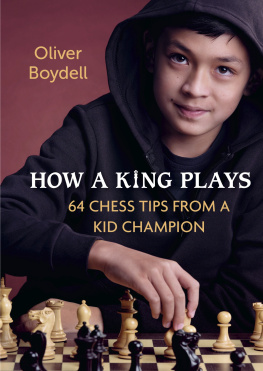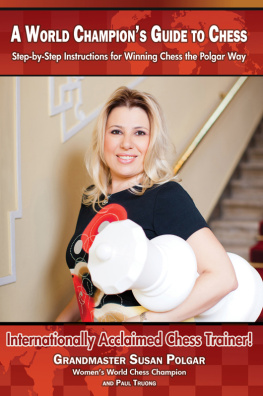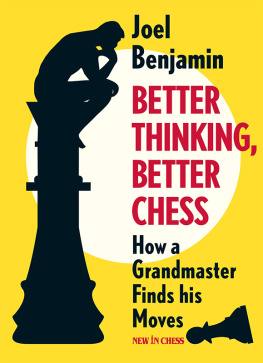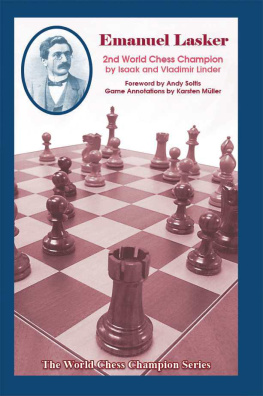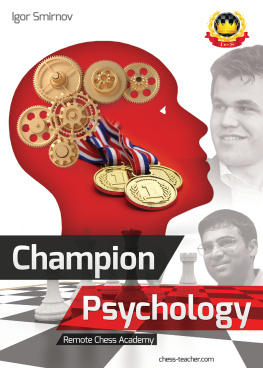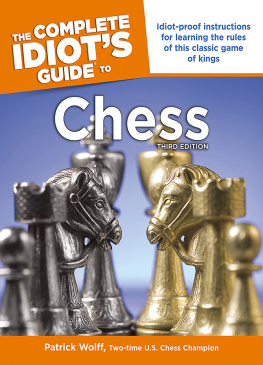Joel Benjamin - World Champion Chess for Juniors
Here you can read online Joel Benjamin - World Champion Chess for Juniors full text of the book (entire story) in english for free. Download pdf and epub, get meaning, cover and reviews about this ebook. publisher: New in Chess, genre: Detective and thriller. Description of the work, (preface) as well as reviews are available. Best literature library LitArk.com created for fans of good reading and offers a wide selection of genres:
Romance novel
Science fiction
Adventure
Detective
Science
History
Home and family
Prose
Art
Politics
Computer
Non-fiction
Religion
Business
Children
Humor
Choose a favorite category and find really read worthwhile books. Enjoy immersion in the world of imagination, feel the emotions of the characters or learn something new for yourself, make an fascinating discovery.
- Book:World Champion Chess for Juniors
- Author:
- Publisher:New in Chess
- Genre:
- Rating:4 / 5
- Favourites:Add to favourites
- Your mark:
- 80
- 1
- 2
- 3
- 4
- 5
World Champion Chess for Juniors: summary, description and annotation
We offer to read an annotation, description, summary or preface (depends on what the author of the book "World Champion Chess for Juniors" wrote himself). If you haven't found the necessary information about the book — write in the comments, we will try to find it.
World Champion Chess for Juniors — read online for free the complete book (whole text) full work
Below is the text of the book, divided by pages. System saving the place of the last page read, allows you to conveniently read the book "World Champion Chess for Juniors" online for free, without having to search again every time where you left off. Put a bookmark, and you can go to the page where you finished reading at any time.
Font size:
Interval:
Bookmark:
World Champion Chess for Juniors
Joel Benjamin
World Champion Chess for Juniors
Learn From the Greatest Players Ever
New In Chess 2020
2020 New In Chess
Published by New In Chess, Alkmaar, The Netherlands
www.newinchess.com
All rights reserved. No part of this book may be reproduced, stored in a retrieval system or transmitted in any form or by any means, electronic, mechanical, photocopying, recording or otherwise, without the prior written permission from the publisher.
Cover design: Buro Blikgoed
Supervision: Peter Boel
Editing and typesetting: Frank Erwich
Proofreading: Dennis Keetman
Production: Anton Schermer
Have you found any errors in this book?
Please send your remarks to and implement them in a possible next edition.
ISBN: 978-90-5691-919-1
Explanation of Symbols
The chessboard with its coordinates:
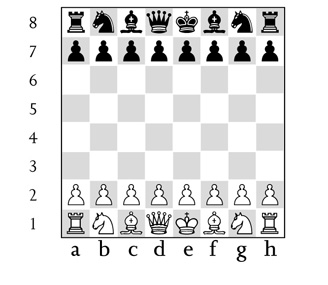
| White to move |
| Black to move |
King | |
Queen | |
Rook | |
Bishop | |
Knight | |
| White stands slightly better |
| Black stands slightly better |
| White stands better |
| Black stands better |
+ | White has a decisive advantage |
+ | Black has a decisive advantage |
= | balanced position |
! | good move |
!! | excellent move |
? | bad move |
?? | blunder |
!? | interesting move |
?! | dubious move |
Introduction
If you are not a junior, please dont toss this book aside; there is still a lot of cool analysis and history in here for you. But I have written this book, primarily, to reach out to younger players. At any point in history, we see a generation gap, where young people see the world in a very different way than their elders. If you are, lets say, a teen or tween, you probably process most chess material from a computer. You follow recent events, work on tactics puzzles, practice against an engine, or whatever works for you. This may match your lifestyle of playing Minecraft or (worse) Fortnite on your I-pad instead of reading books.
A few years ago, I was horrified to learn that two of my (young) fellow instructors at a chess camp could not name the World Champions in order (or even place them roughly in their time periods). For someone of my generation, that fundamental lack of knowledge was unthinkable. And while I accept that kids today learn things in different ways, I feel that they are still missing out from their ignorance of knowledge provided by books.
When I was a boy (back in the Stone Age), chess players read books. Lots of them. We had to of course we didnt have other ways to learn. No computers, no Internet, no databases, and, unless you were lucky to live in a chess center (which I did, actually), no access to coaching.
Looking around at the shelves in my office, I realize that the majority of my books date back to my first few years in chess. I have best games collections from most of the World Champions, and several other greats like Nimzowitsch, Rubinstein, Keres, and Larsen. Those pioneers played a big role in forming my understanding of chess.
You may be thinking, Good for you, what does that have to do with us? Well, while modern chess tools help us learn things and develop skills faster, they dont necessarily cover all the bases. We all stand on the shoulders of giants. Players understand the game today because of stuff players figured out back then. If you want to up your game, its definitely useful to see chess at its highest level. Todays grandmasters, as great as they are, play with assistance of computer analysis and knowledge of a ton of opening variations. In a sense, older games have a purity about them. They are rather more mano a mano (which means hand to hand, by the way).
This book provides a Cliff Notes (ask mom and dad what those are) version of the World Champions, from Morphy (technically not an official champ, but I just couldnt leave him out) to Carlsen. [I have excluded those who won the title from the FIDE knockout tournaments in the early 2000s.] I didnt want this book to outweigh your computer, so I had to whittle down the game list. I went with a combination of a players most famous games and ones I feel are particularly instructive or interesting. Each chapter concludes with two supplemental games, and even then there are plenty of games I hated to leave out.
Though the basic rules are the same as in the 1900s, chess has changed a lot over the years. The champions had different styles and approaches, strengths and weaknesses. They each contributed to our understanding of chess in their distinctive way, and Ive tried to highlight what makes each champion special and worthy of study.
Most of the games are considered classics, and have appeared in many other chess books. You may be familiar with some of them (which is not a bad thing it means you have some chess culture and a decent memory). A lot of the older books have analysis that can be proven faulty by chess engines; this in turn means that a lot of commentary has mistakes, too. So the tactical analysis here is more reliable, though it is still important to remember that chess is a human game. Even top grandmasters, let alone you and your opponents, often dont play the recommendations of chess engines.
Some games are heavy on tactics (working on Tals games was particularly exhausting), but Ive given more attention, at least in the majority of the games, to explaining the strategy. I want you to see how the great masters approached problem-solving in the opening, middlegame, and endgame, and how these solutions can relate to your own games. I have tried to find universal truths and provide instruction beyond how the players could have found better moves. I have also sought a variety of openings and a mixture of attacks and endgames to give as complete a course as possible.
I wanted this book to be more than a collection of cool games. I have included a bit of historical information about the players to put the games into proper context. I hope readers get a sense of why players succeeded or failed at certain times, how their styles evolved over their careers, and even which rivals they liked or couldnt stand.
All of these players, some more than others, have had an impact on my chess career personally. Before we get halfway through the book, the champions are playing within my lifetime. Ive included a bit about how I interacted with several of them (never quite beat any of them).
I majored in history, so you can understand why I enjoyed learning more about these champions. But even if you arent a trivia buff, you might want to pick a favorite player... and that champion might influence your future study and approach to the game. Feel free to choose your hero (or heroes). [It can still be Magnus after you finish the book.]
Next pageFont size:
Interval:
Bookmark:
Similar books «World Champion Chess for Juniors»
Look at similar books to World Champion Chess for Juniors. We have selected literature similar in name and meaning in the hope of providing readers with more options to find new, interesting, not yet read works.
Discussion, reviews of the book World Champion Chess for Juniors and just readers' own opinions. Leave your comments, write what you think about the work, its meaning or the main characters. Specify what exactly you liked and what you didn't like, and why you think so.

